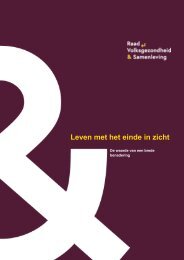Buiten kerk en moskee
Religie in een pluriforme samenleving. Diversiteit en verandering in beeld.
Religie in een pluriforme samenleving. Diversiteit en verandering in beeld.
Create successful ePaper yourself
Turn your PDF publications into a flip-book with our unique Google optimized e-Paper software.
etwe<strong>en</strong> 2015 and 2020. A quarter of agnostics and atheists now have no problem with<br />
governm<strong>en</strong>t support for maintaining church buildings. Roughly one in t<strong>en</strong> people in the<br />
Netherlands are characterised as ‘cultural Christians’: while they are not themselves practising<br />
Christians, they acknowledge the value of religion and the Church for society.<br />
This study developed a new (for the Netherlands) instrum<strong>en</strong>t to measure and test meaningfulness,<br />
and deployed it for the first time. This measurem<strong>en</strong>t instrum<strong>en</strong>t comprises<br />
three sub-dim<strong>en</strong>sions which together offer a measure of meaningfulness: coher<strong>en</strong>ce, life<br />
purpose and meaning. On a scale running from 1 to 7, the Dutch score an average of<br />
around 5. The differ<strong>en</strong>ces by various background characteristics (such as sex, age and education)<br />
are small, but (traditional or spiritual) believers do g<strong>en</strong>erally score higher on meaningfulness<br />
than agnostics or atheists. As expected, there is a positive correlation betwe<strong>en</strong><br />
meaningfulness and happiness, but our measurem<strong>en</strong>t instrum<strong>en</strong>t is also able to distinguish<br />
betwe<strong>en</strong> these two concepts. People who feel they derive (a lot) of meaning from<br />
their lives compared with their degree of happiness are g<strong>en</strong>erally younger and unmarried,<br />
less likely to have a high income and more likely to follow traditional or spiritual ideas.<br />
Meaningfulness as (self-)developm<strong>en</strong>t and ‘<strong>en</strong>joying life’<br />
Chapter 5 is based on interviews with modern-day spirituals, agnostics and atheists, all<br />
non-affiliates of (traditional) religions, in which the c<strong>en</strong>tral question was what gives their<br />
lives meaning. We also described the landscape in which these groups live their lives. For<br />
modern-day spirituals, the most important thing is to develop and detach in order to come<br />
closer to their auth<strong>en</strong>tic core, whereas agnostics and atheists would rather ‘<strong>en</strong>joy life’.<br />
Agnostics and atheists do (of course) also experi<strong>en</strong>ce meaningfulness, and associate it<br />
more with giving than taking and in connecting with the greater whole. Compared with<br />
affiliates of traditional religions, both groups appear to be individualistic, saying they build<br />
their own meaningfulness framework rather than taking a lead from, say, religious authorities.<br />
There is a degree of t<strong>en</strong>sion here: on the one hand modern-day spirituals, agnostics<br />
and atheists stress the importance of building their own framework of meaningfulness,<br />
whilst on the other they also want to be part of a greater whole.<br />
Agnostics and atheists are slightly more oft<strong>en</strong> m<strong>en</strong>, while wom<strong>en</strong> are overrepres<strong>en</strong>ted<br />
among modern-day spirituals. Another differ<strong>en</strong>ce betwe<strong>en</strong> the two groups is that modernday<br />
spirituals g<strong>en</strong>erally feel they are part of a larger, connected whole which ext<strong>en</strong>ds<br />
beyond the grave, whereas agnostics and atheists see themselves more as individual<br />
atoms in a large universe – atoms which disappear forever wh<strong>en</strong> they die.<br />
Both modern-day spirituals and agnostics and atheists associate happiness more with<br />
‘something in yourself’ and with ‘positive things’, while meaningfulness is related to others<br />
and can also incorporate negative experi<strong>en</strong>ces, such as sadness. Where modern-day spirituals<br />
g<strong>en</strong>erally (may) experi<strong>en</strong>ce setbacks as meaningful, agnostics and atheists see suffering<br />
more as something that has to be borne stoically. Both groups regard happiness as a<br />
privilege, something that happ<strong>en</strong>s to you, that is ephemeral, and that cannot be fully controlled.<br />
By contrast, the interviewed respond<strong>en</strong>ts see meaningfulness as something that<br />
can be controlled to a greater degree and that is longer-lasting and can be perman<strong>en</strong>t.<br />
169 s u m m a r y










